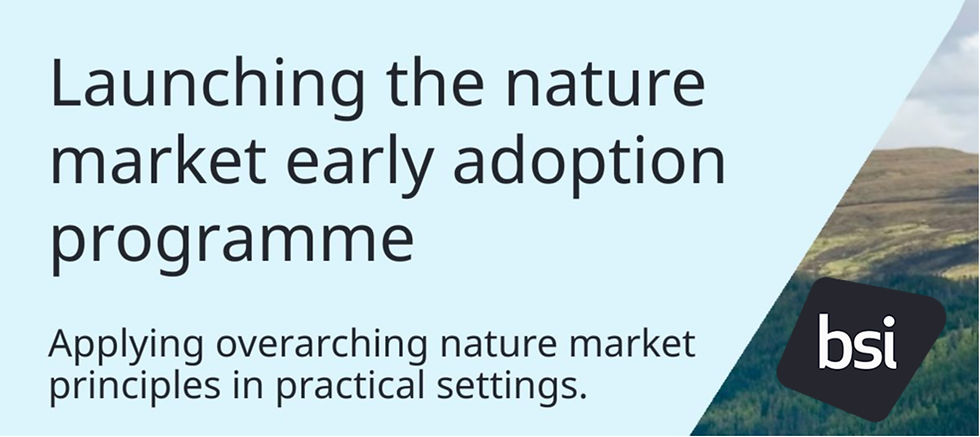ISO 14054, early adaptors to BSI Flex 701, and sharing natural capital, nature markets and biodiversity
- eftec

- Nov 25, 2025
- 5 min read
Updated: Nov 26, 2025
In this Month's Newsletter:
Newly published - ISO 14054 Natural Capital Accounting for Organisations
Register for the launch webinar on 27 January 2026
BSI Flex701 early adopters have been selected
Organisations have committed to adopting the new Nature Market Standard
Spreading the word on natural capital accounting, nature markets, and biodiversity
From ecologists to economists and sustainability professionals sharing experiences and language
Newly published - ISO 14054 Natural Capital Accounting for Organisations
Register for the launch webinar on 27 January 2026

There is a need for standardized approaches and metrics to assess and value natural capital, create an inclusive process, communicate the process and the results, and enable auditing. ISO 14054:2025 Natural Capital Accounting for Organisations now sets a global benchmark to do just that.
Our CEO Ece Ozdemiroglu and Dr Stephanie Hime, CEO of Little Blue Research, who were co-leaders of the working group that prepared the Standard, the launch webinar on 27 January 2026 (10:00 – 12:00 GMT). Other speakers will include ISEP, Capitals Coalition and UKNEE. The webinar will take us through the standard and its uses for decision making, including nature markets. Click here to register for the event.
ISO 14054 supports organizations in developing natural capital accounts by describing the systematic collection and analysis of financial, environmental, and socio-economic information and present it in the form of Natural Capital Income Statement and Natural Capital Balance Sheet. The standard shows what good practice of preparing and interpreting natural capital accounts looks like. It introduces a flexible approach but demands documentation of scope, data sources, data quality, assumptions, and methodologies, helping organisations produce reliable and credible results.
Ece and Stephanie presented this work in a COP30 fringe event for forest certifiers. The article can be found here.
Ready to embed nature into your business decisions? Drop us a line on [email protected].
BSI Flex701 early adopters have been selected
Organisations have committed to adopting the new Nature Market Standard

Nature markets are gaining traction across the UK, and internationally with the overall aim of providing additional environmental benefit via the sale of ‘nature credits’ and efficiency via trade. Buyers want to know that what they are purchasing is legit, providing real environmental gain, and suppliers need to know how to prove the credits they supply is true and long lasting. That’s where BSI’s Nature Market Principles Standard (BSI Flex 701) steps in and why suppliers of nature credits are keen to adopt the standard.
As this is the first year of the standard since its launch, Defra and BSI offered to support organisations in the transition to certification. Over 50 organisations applied and nine will participate, including Ridge Carbon Structure and Zulu Ecosystem (Peatland Code), Woodland Carbon Code, Wilder Carbon, Nattergal, Environment Bank, EnTrade, Native Aqua and Evenlode. Their piloting will test how a single set of overarching principles can provide consistency across nature markets and help bring much needed private investment into the natural environment.
In Spring 2026, following the early adopters programme, BSI will produce practical case studies and an assessment guidance showing how diverse organisations have put the standards into practice. These case studies will serve as guides for future organisations to align to the standard.
The official announcement is published here.
Spreading the word on natural capital accounting, nature market and biodiversity
From ecologists to economists and sustainability professionals sharing experiences and language

We always advocated that environmental issues need multidisciplinary teams and we are almost always part of such teams. It makes for interesting debates and work, and it would probably be impossible to have any positive impact on nature any other way. It is also challenging, as even with the best of intentions, we all come with our preferences and languages. The more people work together or at least come together the more they will understand each other and tackle these challenges.
It is for this reason that we were delighted to join a variety of events in the last month:
Our CEO, Ece Ozdemiroglu, presented at the Westminster Energy, Environment & Transport Forum policy conference: Next steps for environmental protection and the planning system in England. She reminded the audience how we got to talking about nature markets, from polluter pays and beneficiary pays policies to deliver nature positive outcomes more efficiently. She also presented a summary of our analysis of the first year of the Biodiversity Net Gain (BNG) in England. Ian and Angus are talking about that study at the next UKNEE webinar on 3rd December, register here
Principal Consultant, Russell Drummond, spoke at Britain’s Forest Future, which is Britain’s largest woodland research, policy and practice knowledge sharing event, and is organised by Defra. Russell presented on eftec’s recent work for Defra on integrating the benefits of forest biodiversity into policy and practice. The work demonstrates that households are supportive of improving forest biodiversity and the value they put on improving biodiversity, including for forest’s provision of wellbeing, recreation, and health benefits, and its benefit to future generations and wildlife.
Our Director, Ian Dickie, at the ESG Autumn Summit in Ireland as a panellist, discussing ‘Climate Finance and the new era of ESG’. The panellists discussed the shifting landscape of climate finance, how well Irish firms are adapting to climate-related risks, and what investors expect from corporate climate data amid growing concerns about reporting credibility. Ian described how the nature markets standard (BSI Flex701) is designed to support market integrity, and the natural capital accounting standard (ISO 14054) helps document investments in nature and the additionality of nature-based credits.
Ian also responded to the launch of the British Ecological Society and National Trust’s Aligning Environmental Agendas for Nature Recovery. As a member of Defra’s Biodiversity Expert Committee, Ian was a supporting author on the Aligning Environmental Agendas for Nature Recovery report. The report calls for an ecosystem approach as the only way to halt UK wildlife decline and protect the vital services nature provides.
Ian said, “A key hurdle to funding ecosystem approaches is that we don’t value our natural assets in our national accounting. Take a woodland. This is an asset that’s helpful to society, it improves air quality, regulates water flow and provides places for recreation to keep us healthy, but we don't measure any of that in our GDP figures. It’s invisible to many decision-makers.
“If we destroy that woodland, there's no record of the loss in the national economic data. But if we turn it into something else, that value is recorded, so our data says we’ve got wealthier and had economic growth, so are better off. But we may not be. We've just exchanged an asset we don't measure for an asset we do. Sometimes we're just tricking ourselves.”




Came across this while lurking a UK online casino thread late one Monday morning. What kept me reading was how down‑to‑earth the feedback was — talk about login speed, clean navigation, and sensible terms instead of loud claims about “ultimate UX” or “next‑level gameplay.” The straightforward tone was refreshing.
A handful of players pointed to Zebra Wins sister sites as decent alternatives worth checking out. There weren’t any over‑the‑top endorsements, just honest impressions from people who’d played there. When I finished scrolling, it genuinely felt like community feedback, not an ad.
good